Being Black and Well

Caring for ourselves and our well-being is essential to achieving our goals and living a happy life. Throughout Black History Month, NC State’s campus cultural centers are exploring the question of what it means to be Black and well through events curated around the theme ‘Divine Hands: An Exploration of Black Spirituality, Healing and the Arts.’
Black History Month, which takes place during the month of February, honors the achievements of Black Americans and recognizes the central role of African Americans in United States history. NC State’s campus celebration is rooted in the African American Cultural Center (AACC), a welcoming and cozy hub that affirms the Black experience for students, faculty and staff on campus.
The theme, ‘Divine Hands,’ was developed by the students and staff of the AACC, in partnership with the LGBTQ Pride Center and other campus community centers. It invites everyone in the Wolfpack to celebrate the fullness, creativity and spirit of Black history and heritage, while understanding and caring for our whole selves, today.
The decision to center the campus celebration around Black wellness was inspired and guided by students’ ongoing need for connection, conversation and resources related to mental health and well-being.
I really want folks to be walking away with a sense of joy and pride in their own identities.
“I like [the theme] so much because I think it’s really relevant to the time right now, where our own wellness — especially as college students, and especially mental health — has become a big concern,” said Neil Alexander Phillips, a fourth year design studies major who serves as a student gallerist intern in the AACC gallery.
“[Black wellness] involves creating that space to care for ourselves,” he said. “It involves seeking support in the community that validates our perspectives as Black people and it also means to bring ourselves relief from standards and stereotypes and things that don’t serve us too well. Sometimes we live with these expectations: I need to prove myself, I need to work twice as hard, I’ve got to be resilient, I’ve got to be excellent all the time…It’s nice that we highlight Black excellence so much, but what about being Black ordinary sometimes? Sometimes, that is excellence.”
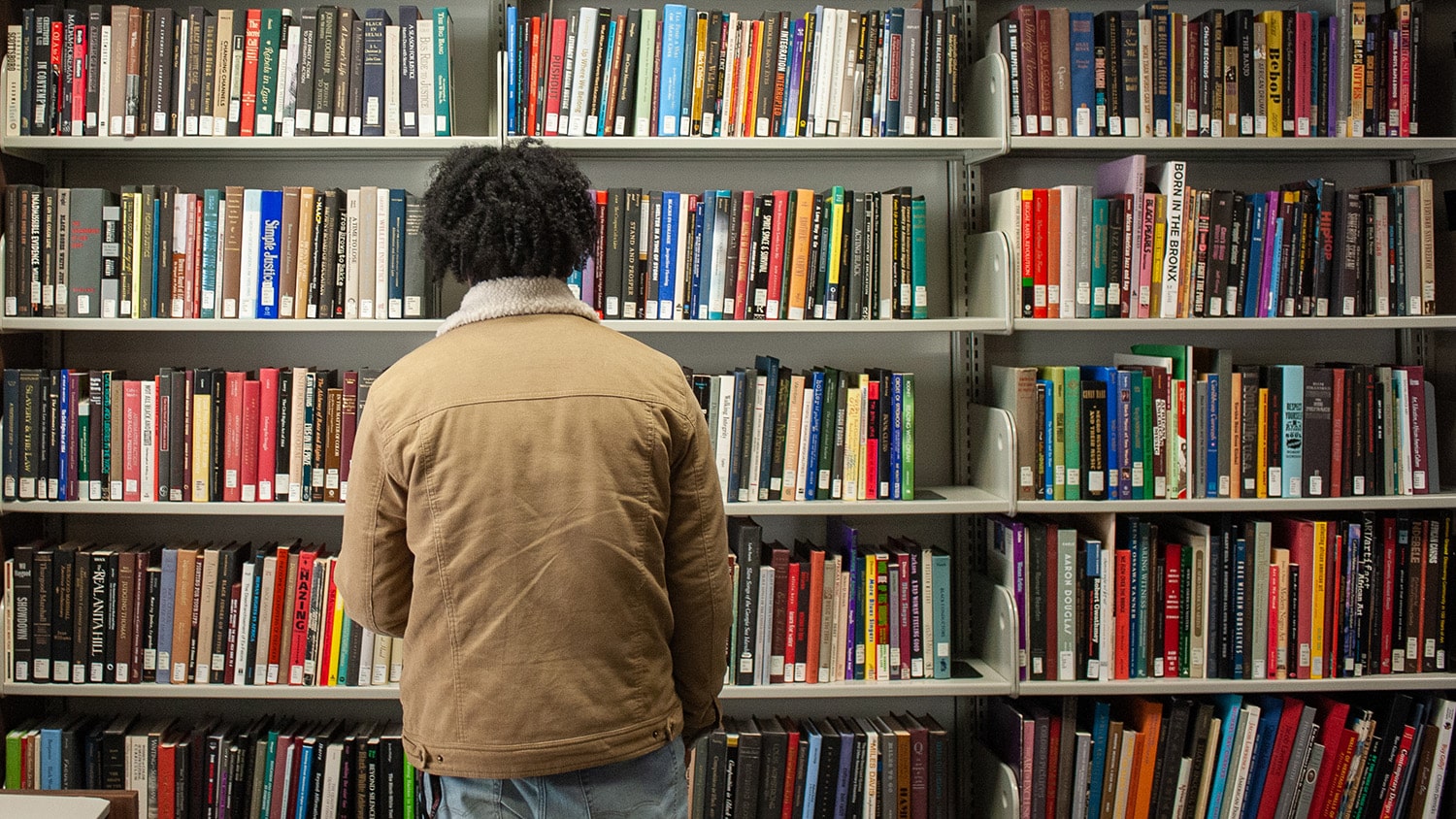
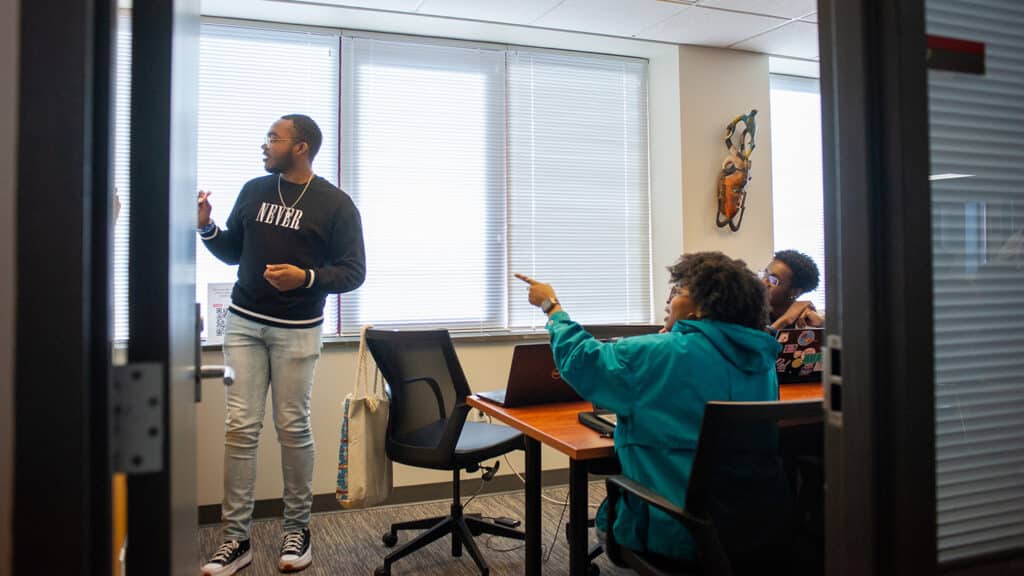
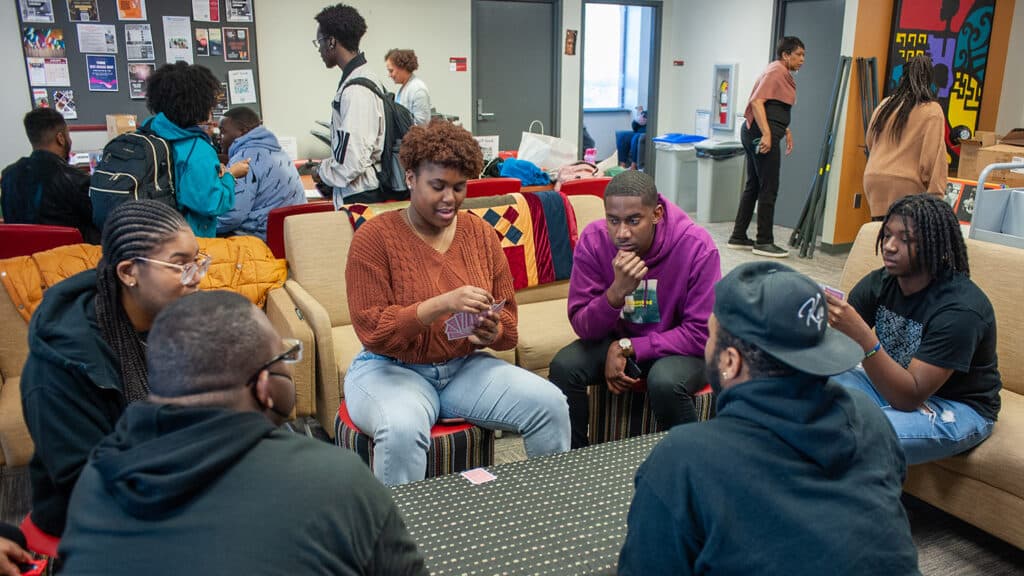
To help students cultivate wellness and tap into campus communities throughout the month, the AACC and various campus partners are hosting events focused on caring for the intersectional layers of our identities — celebrating all the things that make you you.
“I really want folks to be walking away with a sense of joy and pride in their own identities,” said Jae Edwards, assistant director of the LGBTQ Pride Center.
Healing through movement, connection and learning
Healing is fundamental to wellness. Throughout Black History Month, there are events to help you tap into new ways to practice and explore healing, as well as methodologies that could serve or inspire you.
Featured guest presenters Marquita Sams and Mikael Owunna are scholars, practitioners and artists who will host interactive events that highlight the intersectionalities of healing, spirituality and the arts.
Two important, and sometimes overlooked, approaches to healing are play and movement. Sams — a social worker and mental health therapist, as well as a choreographer and dancer — will host a dance healing workshop, Miracles in Motion, where all abilities and experience levels are welcome.
“Combining all of the elements is going to create such an interesting space,” said Andaiye Qaasim, assistant director of the AACC. “From using movement to heal your inner child to energy work — there are just so many different things she pulls in that I think are going to be new for folks.”
Another way to explore healing is through learning about yourself, understanding inherited traumas and finding new modalities for processing your experiences. The AACC has curated a collection of books to help students find what healing could look like for them, during the Black Book Blitz at the AACC library and gallery in Witherspoon Student Center.
“This year’s Book Blitz [theme] is 29 Days of Healing, where the 29 works and 29 authors are symbolic of the 29 days of Black History Month,” said Brionna Johnson, library coordinator for the AACC. “We want to celebrate the authors. We want to celebrate healing in the community, Black history, Black storytelling and Black futures.
“Books are a great source of healing, and I can’t wait to share some of our collection with guests.”
Planning for the book blitz has been a collaborative experience for those organizing the history month’s events. As part of his role as student gallerist intern, Phillips went through the AACC’s extensive library database to help narrow down this year’s book genres and weigh in on the final selections. He is also helping design the overall exhibit experience for visitors, which will include a collection of photography from the AACC’s archives.
“We want to grant an experience that makes people feel comfortable with this theme and topic,” said Phillips. “A lot of people, they might be well into their journey of discovering what this stuff means to them, but some people might be just starting. Wherever anyone is in their walk of life, what I want to do is make this experience something that they can tailor to themselves, something that they can make their own and something that they can apply within their own lives.”
Cultivating openness through spiritual practices
Another area for exploration during Black History Month is Black spirituality and the vibrant cultures of the African diaspora. Open spiritual practices — meaning those that don’t require you to have been born or initiated into them, including astrology, tarot or certain Afro-Diasporic practices — can provide a means of self-discovery and connection to a sense of something bigger than yourself.
“I think the spirituality component is a layer that we’ve missed in conversations about wellness and what it means to be well,” said Qaasim.
One opportunity to learn more about these practices is a screening of Obi Mbu (The Primordial House), an experimental film, followed by a discussion with Sams and Owunna, who is a multimedia artist and engineer. The film captures the movement of dancers illuminated with fluorescent paint and ultraviolet light as they enact an Igbo-Nigerian myth of creation.
You can also connect with Owunna’s research and work during Black Transfigurations, a presentation of his multimedia artwork that transfigures Black bodies into vessels of eternal life. The works explore the intersections of visual media with engineering, optics, Blackness and African cosmologies.
In thinking about healing in the context of Black History Month, Phillips spoke about the need to comprehend what our roots and identities mean to us. He referenced the concept of Sankofa, a West African proverb that translates into English as “it is not taboo to go back and fetch what you forgot.”
“What that means is don’t forget where you came from, don’t forget that the things that make up who you are are beautiful and you are beautiful because of that,” said Phillips. “It kind of creates this acknowledgement of who we are as people.”
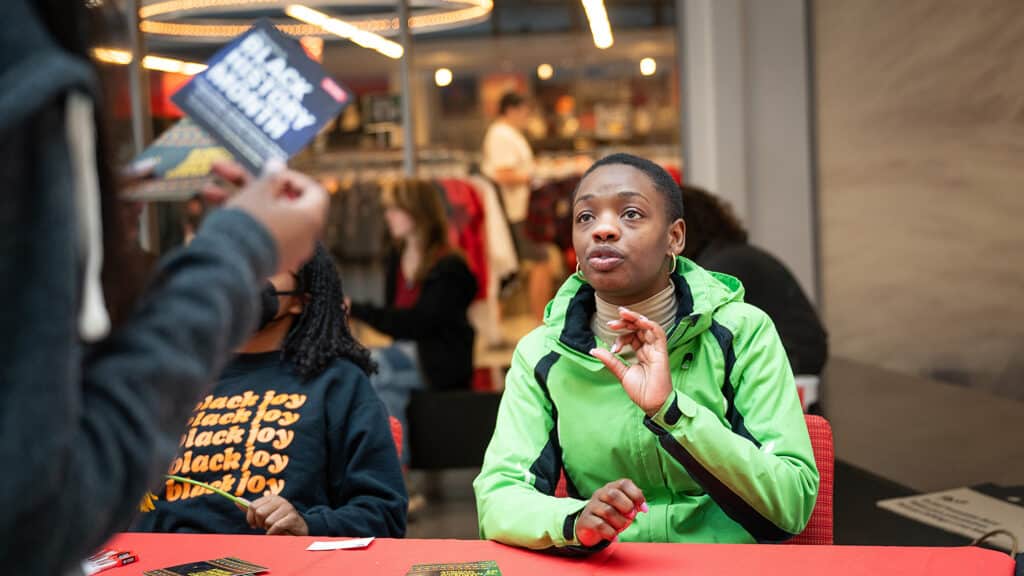
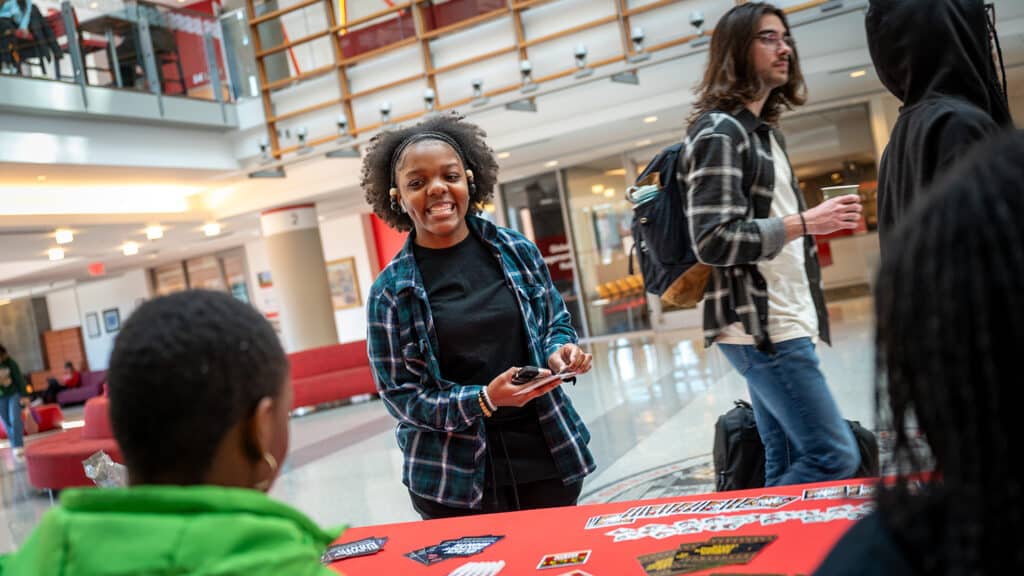
Self-expression through art, food and connection
Finding ways to express yourself — through creative endeavors, sharing your culture with others or having meaningful conversations with friends — is another essential component of Black wellness. Expression is woven through every event taking place during Black History Month, but it will be given center stage during an open mic night and student-led diaspora dinners.
Even though Blackness is just one aspect of my identity, that aspect of my identity is beautiful.
Student performers and creatives can take part in the open mic, which is the closing event of the 29 Days of Black Healing exhibit. It’s a chance to come together in the AACC, connect again with the book collection and imagery featured in the gallery and hear from peers about their experiences through art, music and spoken word.
“Our bodies are different. Our heritage is different. Our experiences are different. Even within the Black community, that’s all different. We’re not monolithic. Our viewpoints, our stances are different,” said Phillips. “Even though Blackness is just one aspect of my identity, that aspect of my identity is beautiful. Part of it has to do with why I’m here [in the AACC] — because I feel comfortable. I’m able to connect with people in ways that I’m not able to in other spaces.”
Students can also connect during the timeless tradition of breaking bread together on Friday nights throughout February when student ambassadors and organizations host Diaspora Dinners to share their cultures through the cuisines of the African continent and diaspora. NC State Dining is also celebrating Black History Month with special Southern and Caribbean menus curated by Chef Antonio Eaton each Wednesday in February.
Throughout the month of February — and all year long — members of the NC State community are encouraged to find ways to apply the tenets of this year’s Black History Month theme and tailor their own wellness experience. No matter how you choose to engage, the event organizers hope you’ll find spaces for connection, reflection, discovery and fun.
“We want to engage people’s stories and the things that are important to all of us in terms of places where we feel cared for,” said Phillips of the 29 Days of Healing exhibit. “I think it’s essential to the atmosphere in which healing can take place, in the sense that it creates a space where we can take inspiration, or we can find beauty in what healing looks like for each other.”
This post was originally published in NC State News.
- Categories: